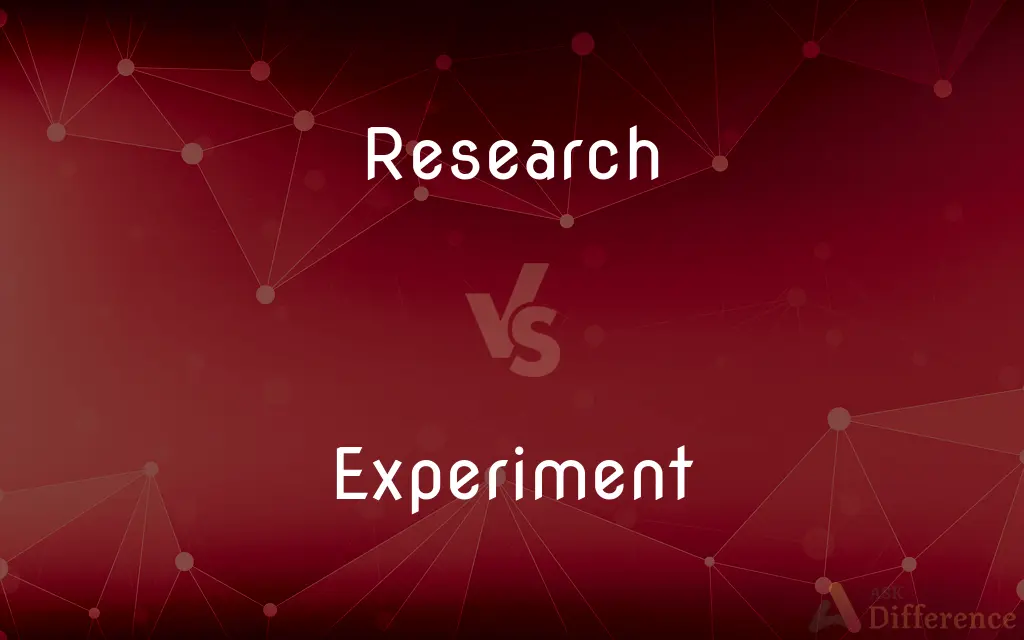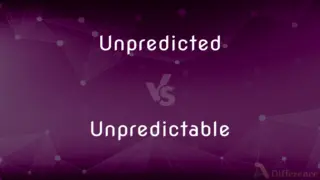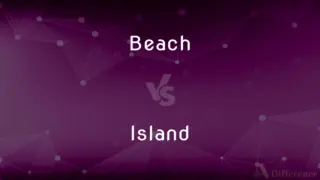Research vs. Experiment — What's the Difference?
By Maham Liaqat & Urooj Arif — Updated on April 1, 2024
Research is a broad process of collecting, analyzing, and interpreting information to answer questions or solve problems, while an experiment is a controlled procedure conducted to test hypotheses and observe the effects of manipulating variables.

Difference Between Research and Experiment
Table of Contents
ADVERTISEMENT
Key Differences
Research encompasses a wide range of activities designed to gather knowledge on a subject, employing various methods such as surveys, case studies, and literature reviews. It aims to establish facts, reach new conclusions, and develop theories across disciplines. On the other hand, an experiment is a specific type of research that involves the manipulation of variables under controlled conditions to study cause-and-effect relationships. It's a methodological approach used primarily in the sciences to test hypotheses and theories.
While research can be qualitative or quantitative, involving theoretical or applied science, experiments are inherently quantitative, focusing on measurable outcomes derived from manipulating one or more variables. Research might explore broad questions through diverse methodologies, seeking to understand phenomena in depth. In contrast, experiments seek precision and control, isolating variables to determine their direct effects on particular outcomes.
The goal of research is often to explore, describe, explain, or predict phenomena, utilizing a variety of data collection methods based on the nature of the study and its objectives. Whereas the goal of an experiment is more narrowly focused on testing specific hypotheses by observing the outcomes of deliberate changes made to the experimental environment or subjects involved.
Research methodologies can vary widely based on the discipline, question at hand, and available resources, allowing for flexibility in approach and application. Experimental design, however, requires rigorous planning to ensure the validity and reliability of results, including considerations for control groups, randomization, and replication.
Both research and experimentation contribute significantly to the advancement of knowledge, but they do so through different paths. Research provides the foundation and direction for further inquiry, including experimentation. Experiments, by their nature, provide a more focused and controlled way to test the validity of specific hypotheses within the broader context of research.
ADVERTISEMENT
Comparison Chart
Definition
A systematic investigation to establish facts or principles or to collect information on a subject.
A controlled procedure to test a hypothesis by manipulating variables and observing the effects.
Purpose
To explore, describe, explain, or predict phenomena.
To determine the cause-and-effect relationships by observing the effects of manipulated variables.
Methodology
Can be qualitative or quantitative; diverse methods including surveys, case studies, and literature reviews.
Quantitative, involving controlled manipulation of variables and observation of outcomes.
Scope
Broad, can encompass theoretical exploration or applied science.
Focused, primarily on testing specific hypotheses under controlled conditions.
Outcome
Varied, can lead to new theories, establish facts, or develop new insights.
Specific, aimed at confirming or refuting hypotheses based on observed changes in variables.
Compare with Definitions
Research
Systematic study to gain new knowledge.
Her research on climate change contributed valuable insights into global warming effects.
Experiment
A test under controlled conditions to examine hypotheses.
The experiment tested the effect of light on plant growth.
Research
Can involve collecting data from various sources.
His research involved analyzing historical documents to understand ancient civilizations.
Experiment
Involves manipulating one variable to see its effect on another.
They conducted an experiment to see how temperature affects chemical reaction rates.
Research
May utilize various methodologies based on the subject.
Qualitative research methods were used to study consumer behavior.
Experiment
Aims to provide empirical evidence.
The experiment provided evidence supporting the new vaccine's efficacy.
Research
Broad in scope, encompassing different fields.
Her research in psychology explores human cognitive development.
Experiment
Often used in scientific research.
Experiments in physics often require precise measurements and controlled environments.
Research
Aims to establish or confirm facts and reach new conclusions.
Their research established a link between diet and heart health.
Experiment
Can be replicated to verify results.
The experiment's results were replicated in labs worldwide, confirming the findings.
Research
Research is "creative and systematic work undertaken to increase the stock of knowledge". It involves the collection, organization, and analysis of information to increase understanding of a topic or issue.
Experiment
An experiment is a procedure carried out to support or refute a hypothesis. Experiments provide insight into cause-and-effect by demonstrating what outcome occurs when a particular factor is manipulated.
Research
The systematic investigation into and study of materials and sources in order to establish facts and reach new conclusions
He prefaces his study with a useful summary of his own researches
Medical research
The group carries out research in geochemistry
Experiment
A test under controlled conditions that is made to demonstrate a known truth, examine the validity of a hypothesis, or determine the efficacy of something previously untried.
Research
Investigate systematically
The team have been researching into flora and fauna
She has spent the last five years researching her people's history
Experiment
The process of conducting such a test; experimentation.
Research
Careful study of a given subject, field, or problem, undertaken to discover facts or principles.
Experiment
An innovative act or procedure
"Democracy is only an experiment in government" (William Ralph Inge).
Research
An act or period of such study
Her researches of medieval parish records.
Experiment
The result of experimentation
"We are not [nature's] only experiment" (R. Buckminster Fuller).
Research
To engage in or perform research.
Experiment
To conduct an experiment.
Research
To study (something) thoroughly so as to present in a detailed, accurate manner
Researching the effects of acid rain.
Experiment
To try something new, especially in order to gain experience
Experiment with new methods of teaching.
Research
To do research for
Research a magazine article.
Experiment
A test under controlled conditions made to either demonstrate a known truth, examine the validity of a hypothesis, or determine the efficacy or likelihood of something previously untried.
Conduct an experiment
Carry out some experiments
Perform a scientific experiment
Research
Diligent inquiry or examination to seek or revise facts, principles, theories, applications, etc.; laborious or continued search after truth.
The research station that houses Wang and his team is outside Lijiang, a city of about 1.2 million people. File:The research station that houses Wang and his team is outside Lijiang.ogg
Experiment
(obsolete) Experience, practical familiarity with something.
Research
A particular instance or piece of research.
Experiment
(intransitive) To conduct an experiment.
We're going to experiment on rats.
Research
(transitive) To search or examine with continued care; to seek diligently.
Experiment
To experience; to feel; to perceive; to detect.
Research
(intransitive) To make an extensive investigation into.
Experiment
To test or ascertain by experiment; to try out; to make an experiment on.
Research
(transitive) To search again.
Experiment
A trial or special observation, made to confirm or disprove something uncertain; esp., one under controlled conditions determined by the experimenter; an act or operation undertaken in order to discover some unknown principle or effect, or to test, establish, or illustrate some hypothesis, theory, or known truth; practical test; proof.
A political experiment can not be made in a laboratory, nor determined in a few hours.
Research
Diligent inquiry or examination in seeking facts or principles; laborious or continued search after truth; as, researches of human wisdom; to research a topic in the library; medical research.
The dearest interests of parties have frequently been staked on the results of the researches of antiquaries.
Experiment
Experience.
Adam, by sad experiment I knowHow little weight my words with thee can find.
Research
Systematic observation of phenomena for the purpose of learning new facts or testing the application of theories to known facts; - also called scientific research. This is the research part of the phrase "research and development" (R&D).
Experiment
To make experiment; to operate by test or trial; - often with on, upon, or in, referring to the subject of an experiment; with, referring to the instrument; and by, referring to the means; as, to experiment upon electricity; he experimented in plowing with ponies, or by steam power.
Research
To search or examine with continued care; to seek diligently.
Experiment
To try; to know, perceive, or prove, by trial or experience.
Research
Systematic investigation to establish facts
Experiment
The act of conducting a controlled test or investigation
Research
A search for knowledge;
Their pottery deserves more research than it has received
Experiment
The testing of an idea;
It was an experiment in living
Not all experimentation is done in laboratories
Research
Inquire into
Experiment
A venture at something new or different;
As an experiment he decided to grow a beard
Research
Attempt to find out in a systematically and scientific manner;
The student researched the history of that word
Experiment
To conduct a test or investigation;
We are experimenting with the new drug in order to fight this disease
Common Curiosities
What differentiates research from an experiment?
Research is a broad process of inquiry to gain knowledge, while an experiment is a controlled method of research focusing on testing hypotheses by manipulating variables.
Is one method superior to the other?
No, both are valuable and often complementary; the choice depends on the research question, objectives, and the nature of the study.
How does the methodology differ between research and experiments?
Research methodologies can vary widely, from qualitative studies to surveys, while experiments specifically involve controlled testing of variables.
Can experiments be conducted outside the sciences?
While most common in the sciences, experiments can be adapted for social sciences and other fields to test hypotheses under controlled conditions.
What is the significance of control groups in experiments?
Control groups are crucial in experiments to establish a baseline for comparison, ensuring that the effects observed are due to the manipulated variable.
Can the results of experiments influence further research?
Yes, the findings from experiments can provide direction for further research, either by confirming theories or suggesting new areas of inquiry.
Can research include experiments?
Yes, research can include experiments as part of its methodology to test specific theories or hypotheses.
What role does peer review play in research and experiments?
Peer review ensures the reliability, validity, and overall quality of research and experimental findings before publication.
How do theoretical research and experimental research interact?
Theoretical research often lays the groundwork for experiments, which in turn can validate or challenge existing theories, leading to new research directions.
How do researchers ensure their experiments are ethical?
Ethical considerations involve obtaining informed consent, ensuring participant safety, and maintaining confidentiality, among other protocols.
Share Your Discovery

Previous Comparison
Unpredicted vs. Unpredictable
Next Comparison
Beach vs. IslandAuthor Spotlight
Written by
Maham LiaqatCo-written by
Urooj ArifUrooj is a skilled content writer at Ask Difference, known for her exceptional ability to simplify complex topics into engaging and informative content. With a passion for research and a flair for clear, concise writing, she consistently delivers articles that resonate with our diverse audience.
















































